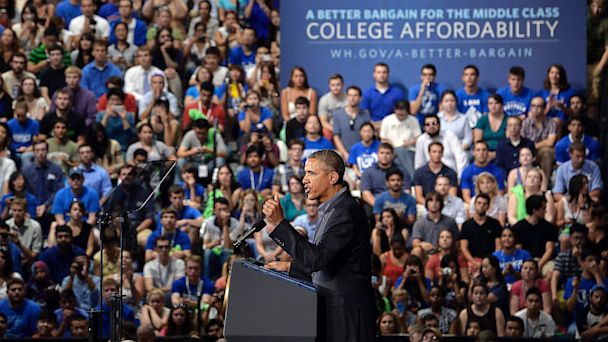Obama Unveils New College Affordability Plan

Jewel Samad/AFP/Getty Images
BUFFALO, N.Y. - At the start of a two day bus tour through two Northeast states Thursday, President Obama introduced a new plan to make college more affordable for millions of students.
"Bottom line is this. We've got a crisis in terms of college affordability and student debt," President Obama told 7,000 students at the University at Buffalo, the State University of New York Thursday. "Higher education cannot be a luxury. It's an economic imperative. Every American family should be able to afford to get it."
The president's plan will create a new ratings system for universities by 2015 that will eventually tie financial aid to college performance and value. The new ratings system will evaluate colleges and universities based on data such as the percentage of students receiving Pell grants, average tuition, scholarships and loan debts, graduation rates, and earnings of graduates.
"It is time to stop subsidizing schools that are not producing good results and reward schools that deliver for American students and our future," Obama said.
The president challenged both universities and students to engage in innovation and competition, and he promised to help ease student loan payments by expanding the pay as you earn system, which caps the amount borrowers pay on student loans to 10 percent of their monthly income, to all college borrowers. Under the current plan, those who borrowed before 2008 or have not borrowed since 2011 are not eligible for the plan.
President Obama shared his own experience with college loans after attending Columbia University and Harvard Law school, saying the payments he had to make extended into his 40's, just before he become a U.S. senator.
"We know a little bit about trying to pay back student loans too because we didn't come from a wealthy family, so we each graduated from college and law school with a mountain of debt. And even though we got good jobs, we barely finished paying it off just before I was elected to the U.S. Senate, right? I mean, I was in my 40s when we finished paying off our debt," Obama said.
Secretary of Education Arne Duncan told reporters the administration won't need congressional approval to enact the ratings system but would seek their input. However, tying financial aid to the ratings system would require approval from Congress, Cecilia Munoz, director of the Domestic Policy Council, said.
"We would expect a solid bipartisan conversation to getting it there," Munoz explained in a conference call with reporters.
While a few Republican governors have embraced such reforms, the president's plan will likely be a tough sell on Capitol Hill. The president's back-to-school timed bus tour comes as lawmakers are on recess, giving the White House an opportunity to outline this plan with little public pushback from across the aisle. Despite being on summer recess, some Republicans released statements criticizing the president's announcement.
"While I am pleased the president's new plan recognizes the importance of promoting innovation and competition in higher education, I remain concerned that imposing an arbitrary college ranking system could curtail the very innovation we hope to encourage - and even lead to federal price controls," Rep. John Kline, R-Minn., chairman of the House Committee on Education and the Workforce, said in a statement.
"While I share the President's goal of making college tuition more affordable, I'm strongly opposed to his plan to impose new federal standards on higher education institutions," Sen. Marco Rubio, R-Fla., said in a statement. "This is a slippery slope, and one that ends with the private sector inevitably giving up more of its freedom to innovate and take risks. The U.S. did not create the best higher education system in the world by using standards set by Washington bureaucrats."
The president sent supporters an e-mail earlier this week saying it is his "personal mission" to find ways to make college affordable. Earlier this month, the president signed into law a plan which kept student loan rates from doubling from 3.4 percent to 6.8 percent.
While the president was focused on education during his speech, he made a bit of the flub at the beginning by referring to Brian Higgins as the mayor of Buffalo, when he's actually the congressman. The president, who celebrated his birthday earlier this month, attributed the mistake to his age.
"This is what happens when you get to be 52-years old. When I was 51, everything was smooth," he said.
The president will continue his bus tour on a sleek black bus with a small presidential seal emblazoned on both sides. He will speak at Henninger High School in Syracuse, N.Y., Thursday afternoon. On Friday, he speaks at Binghamton University and Lackawanna College in Scranton, Pa., hometown of Vice President Joe Biden, who will join him there.